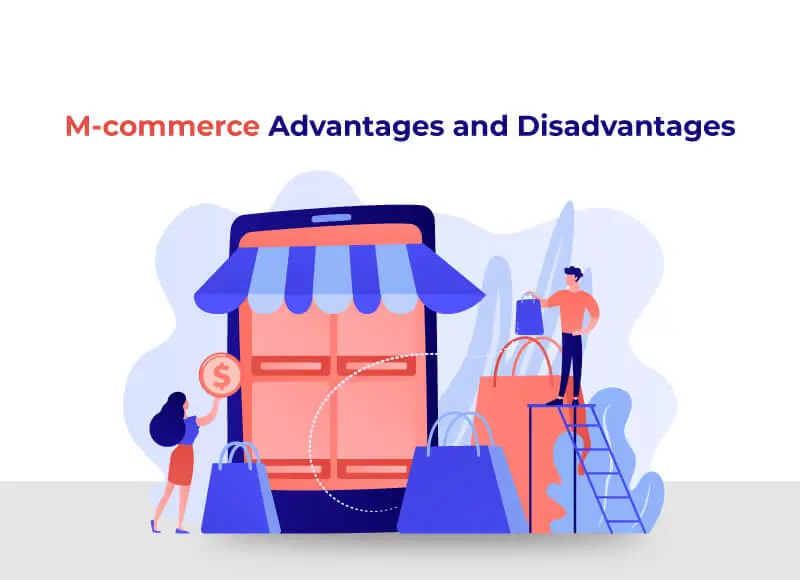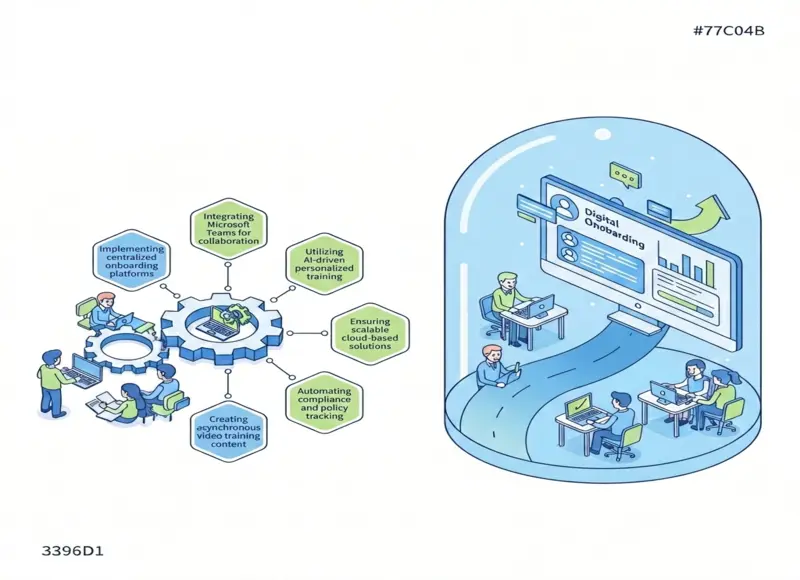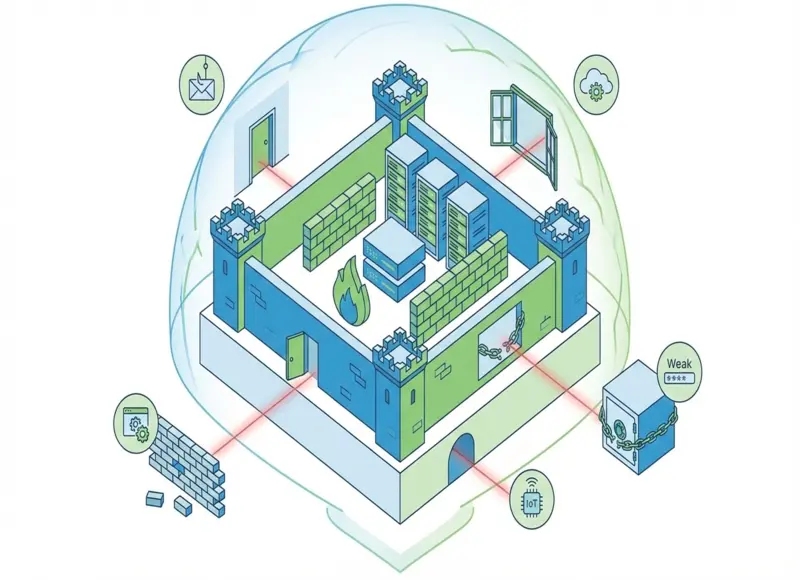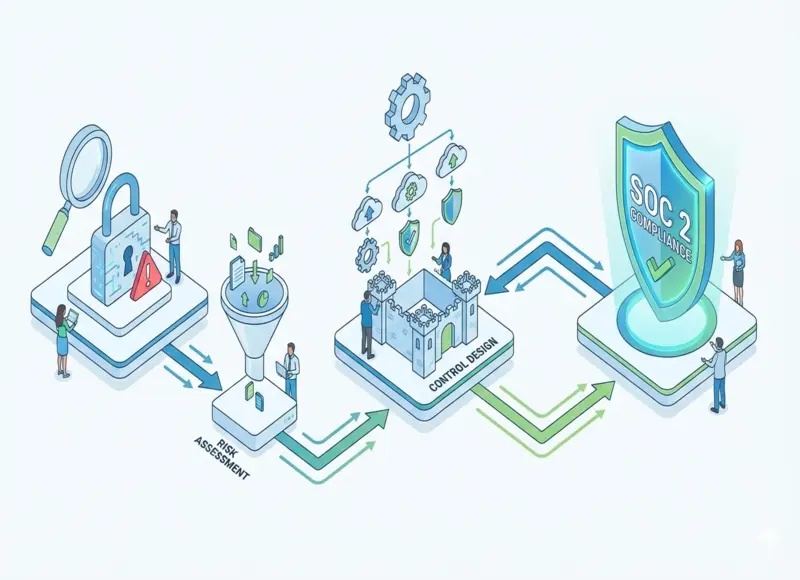Table of Contents
Discover the key advantages and disadvantages of M-Commerce in 2025. Learn how mobile commerce is changing the future of retail, boosting user engagement, and driving faster transactions, along with the challenges businesses must overcome. Stay ahead with

If you're a technology-savvy person, then you may have heard of Mobile commerce, also known as M-commerce. This ultimate term has gained great importance and fame in the online Industry, which serves to conduct online activities.
Buying & selling products, making online payments, and paying monthly bills are some activities that anyone can perform hassle-free using M-commerce. Based on the device you genuinely use, either a personal computer or mobile phone, you can conduct online activities & get the fantastic benefits of M-commerce.
Not just this, with the help of this ultimate technology, you can also do online shopping while traveling somewhere and easily make payments from your smartphone. In short, this wireless solution has become the utmost need for so many technology-savvy users. And this is the reason that the leading eCommerce development agencies are focusing on it utilizing the best approaches and practices.
If you're also keen to use it, let's move ahead to the primary section of this article that we want to discuss thoroughly – The advantages & disadvantages of M-commerce! To make your life stress-free, you must try out this trending technique in the market.
Why waste time? Let’s start reading the advantages first & then we’ll move to the disadvantages.
What is M-Commerce?
M-commerce, or mobile commerce, refers to the buying and selling of goods and services using mobile devices, such as smartphones and tablets. It is an extension of e-commerce or electronic commerce, which refers to online transactions done over the internet. M-commerce allows various activities, including mobile banking, mobile ticketing, mobile marketing, and mobile payments.
M-Commerce vs E-Commerce: What's the Difference?
While m-commerce and e-commerce share similarities, such as internet use for transactions, they differ in terms of the devices used. E-commerce transactions are conducted over desktop or laptop computers, while m-commerce transactions are conducted over mobile devices. The rise of mobile devices has led to an increase in m-commerce, which is expected to continue to grow.
|
Feature |
M-Commerce |
E-Commerce |
|
Device Dependency |
Smartphones, tablets |
Desktops, laptops |
|
Accessibility |
Anywhere with internet & apps |
Limited to device type |
|
Speed |
Fast transactions, mobile-optimized |
It may be slower on mobile devices |
|
Interface |
Touch-based UI |
Click-and-scroll interface |
|
Use Cases |
On-the-go shopping, push notifications |
Website browsing, email promotions |
M-Commerce improves the user experience by focusing on convenience, speed, and personalization, all of which is necessary in the digital economy.
Top Advantages of M-Commerce
1. Global Reach
The first and foremost advantage of M-commerce is that it enables brands to enter competitive markets they've never considered. Allowing their brand name to gain recognition. In present times, everyone is using their smartphones and internet connection, growing to become potential users for any eCommerce platforms. They can effortlessly search, buy, and sell their products and services.?
As they search and purchase what they like in no time, it will expand the customer base for any leading organization looking to boost its global reach. By providing the best M-commerce services to valued clients, the business can lead to improved ROI, better conversions, increased sales funnels, and maximize productivity in the industry. It may be all that every businessperson wants to achieve using any trending technique or application.
2. Hassle-free Store Access
Mobile commerce has made it easy to access products or services in the fast-moving & crowded market by using wireless devices such as laptops & smartphones. With M-commerce, you don't need to go to the store physically to buy essential goods & services. Instead, you can effortlessly purchase them online.
Easy store access to buy any essential product, service, or brand you wish to buy will save you valuable time and minimize your efforts. The saved time you can use somewhere else to make the most of M-commerce. By browsing the different sections of all the products, you can make a hassle-free purchase by easily accessing the store anywhere, thus ensuring you are also keeping up with the technological trends.
3. Push Notifications for Instant Reach
Push notifications ensure that promotions, offers, and updates reach the user instantly. Unlike email, they don’t get lost in spam folders and have significantly higher open rates. And humans have an attention span limited to a few seconds. Push notifications can do wonders for them.
4. Quick and hassle-free Large Order Processing
If you're running an eCommerce business, then with M-commerce, you can accept multiple orders at a time and boost your order processing limit. Utilizing its best traits and characteristics, you don't need to align the different customers' orders to their order number and check-out dates, and maintain the record of physical transactions.
When your potential customer logs in to your online shopping portal, you will conveniently get everything hassle-free to process their order smartly. And it's pretty obvious when there is nothing to manage manually to accept and process an order; stress-free can take your business to the next level.
5. Upgrade Business Quickly
Utilizing the M-commerce features, you can easily and quickly scale up your online business needs to meet the current market. For example, where money is needed to advertise your business services, you can do online transactions worry-free and manage your budget & inventory on the go.?
Additionally, you may need to invest in multiple campaigns to expand your eCommerce business's global reach. If you utilize M-commerce effectively, you can manage everything in real-time, allowing you to stay ahead. Knowing the real-time inventory needs, you can also manufacture your goods and services accordingly, thus helping your business grow hassle-free.
6. Faster Transactions
Integrated payment gateways, such as Apple Pay, Google Pay, and UPI, make mobile payments quicker and more seamless than traditional online methods. One-click checkouts and biometric verification improve transaction efficiency and reduce cart abandonment.
7. Real-time Analysis of User Data
As mentioned earlier, technology and apps have transformed the way people shop and make online payments. It is concluded that around 86% of online activities are performed on mobile apps. And if you're up-to-date with the M-commerce apps, you may introduce them to your business and gain easy access to user data.
However, if you overlook knowing the real-time analysis of user data through apps, you may lack it! Using M-commerce apps, you can gain insight into what customers are demanding from you and what you need to provide for a satisfying customer journey experience. Thoroughly utilizing the apps and analyzing their data in real-time, you can better meet their needs and create more opportunities for repeat sales.
Disadvantages of M-commerce
Just like M-commerce has so many advantages, it also holds many disadvantages. To run your online or e-commerce business successfully, you must know them thoroughly. So let's discuss them in detail below.
1. Fraud Uncertainties & Security Concerns
The first and foremost disadvantage of M-commerce is that it is prone to numerous frauds and uncertainties, leading to insecurity of confidential data. Yes, this disadvantage is an observed fact that many potential users experience. Not all users prefer online transactions for less stress; some are also hesitant to conduct online transactions.
The reason is that many hackers and cybercriminals have proliferated in the market, intending to hack customers' confidential information. And this is why it becomes quite obvious to take care of confidential details thoroughly; hence, many users prefer not to conduct transactions from their smart devices.
2. Lack of Familiarity With Products/Services/Brands among Rural People
Not every business is located or accessible in urban and affluent areas. However, people living in urban areas may be well familiar with all the brands and thus place their orders and ensure their secure traction.
However, those who lack knowledge about the product or brand and live in rural areas may struggle to perform a smart transaction. Even many of them fail in making online payments hassle-free.
And how can you even consider expanding your business's reach via M-commerce when very few people know your company's services in rural areas? If this is the case, top businesspeople will not provide their services there because locals are not aware of this platform.
3. Dependency on Internet & Mobile Devices
Another disadvantage of using M-commerce is the requirement to access the internet. If you don’t have access to the internet for operating your smart device and placing your order online, you won't be able to enjoy its superior benefits.
Every businessperson and customer who wants to take advantage of M-commerce benefits is required to have a mandatory smart device and an established, secure network connection, so that nobody can face interruptions while processing online transactions. However, if both have the desired internet access and smart devices to use their functions but not an updated app, then it will also not give the desired results. It will lead to disappointment.
4. Trust Issues With Shipment Companies
If you regularly use M-commerce online applications, you may know many trusted and recognized shipping companies that deliver your products promptly. However, if you don't remember trusting companies and blindly trusting them, you can face challenging issues that can even ruin your business reputation.
Because online customers who have placed their orders will demand timely shipping and delivery, if your chosen shipment company is fraudulent, you can lose your valuable customers' data and trust. It will significantly impact your business presence. So, the disadvantage of using an M-commerce platform for your business is that you don't know how to use it effectively.
Search for everything related to the shipment company in advance and then do a partnership with them for quick and hassle-free delivery.
5. Less Customer Interaction
Another disadvantage that forces so many customers to make an offline purchase is less interaction with vendors. When customers place their order, seeing the specification and knowing the features of a specific product, there will be no interaction between the vendor and the customer. And if the customer has any doubts, they often remain and are not often resolved in the best way possible.
However, suppose the customers do shopping offline, visiting the store physically. In that case, they can browse the different categories for the same products and ask any doubts about the manufacturer. The ones who love asking other things about a product, brand, and service never trust M-commerce and prefer doing offline shopping.
6. Security Concerns
With mobile payments and data storage, there’s an increased risk of data breaches, phishing attacks, and unauthorized access. Not all users and companies trust mobile platforms with sensitive financial data. And recently, users have been hesitant to share their financial and personal details because of the rise in scams.
Applications of M-Commerce
M-commerce has numerous applications in various industries. Some of the applications of m-commerce include:
1. Mobile Payments
M-commerce allows consumers to make payments using their mobile devices without needing physical cash or credit cards. This is useful when physical payment methods, such as mobile ticketing or vending machines, may need to be practical.
2. Mobile Banking
M-commerce enables consumers to access banking services using their mobile devices, including checking balances, transferring funds, and paying bills.
3. Mobile Marketing
M-commerce enables businesses to deliver targeted marketing messages to consumers based on their location, preferences, and other relevant factors.
Real-World Examples of M-Commerce Success
Amazon's app, which features a mobile-first layout and one-click checkout, contributes a significant portion of the company's global income.
Starbucks' mobile app allows customers to order, pay, receive rewards, and even tip, changing the coffee-buying experience.
Nike's app integrates limited drops, virtual try-ons, and exclusive discounts to drive loyalty through immersive mobile experiences.
Future of M-Commerce
The future of m-commerce looks promising, with the continued growth of mobile devices and technological advancements. This growth can be attributed to several factors, such as the increasing use of mobile devices, the rise of mobile wallets, and the adoption of new technologies such as augmented reality and voice assistants. As a result, businesses that embrace mobile commerce and adopt new technologies will likely thrive and stay ahead of the competition.
Some popular m-commerce examples include Amazon, eBay, and Uber. These companies have successfully leveraged m-commerce to increase their reach and revenue. In addition, some of the best m-commerce apps include PayPal, Apple Pay, and Google Wallet, which allow consumers to make payments.
Digital Marketing for M-Commerce Success
Digital marketing is a key component in the constantly evolving sector of mobile commerce (M-commerce), helping companies fully utilise the potential of their online presence. It is impossible to undervalue the importance of digital marketing in M-Commerce, as it enables companies to engage with a mobile-first audience and create timely, relevant, and tailored interactions.
The increasing popularity of smartphones by consumers for informational, recreational, and purchasing purposes means that it is important to optimize digital marketing techniques for mobile users to remain sustainable and expand.
This includes targeted advertising, mobile-friendly email marketing, social media interaction to connect with followers, and content marketing, all designed to reach customers who spend a significant portion of their digital lives on mobile devices.
Role of SEO in M-Commerce
Search Engine Optimization (SEO) plays a more significant role in M-commerce than just increasing website presence. The goal is to provide a smooth, convenient mobile shopping experience that meets the needs of customers who are always on the go. Faster page loads, mobile-friendly website design, and content optimized for mobile search queries are the main goals of mobile-specific SEO tactics.
These tactics directly impact Sales and conversion rates, which also increase exposure in mobile search results and generate organic visitors. Furthermore, integrating voice search optimization into SEO techniques can help an M-commerce site become more visible and accessible, enabling it to reach a growing market segment. Voice search is becoming increasingly popular among mobile users.
Choosing a Professional SEO Service Provider
Choosing a professional SEO services provider is essential for implementing SEO plans tailored to the specific requirements of M-commerce. A good service should be knowledgeable about mobile search engine optimization, mobile-friendly website design, and the nuances of mobile search behavior. A track record of accomplishment with other M-commerce clients significantly indicates a provider's ability to deliver results.
Furthermore, creating and implementing customized SEO tactics that complement your target market and company objectives is important. This includes keyword research targeting mobile search queries, local SEO optimization to attract nearby clients, and ongoing performance monitoring to adjust tactics in response to shifting market conditions. Ultimately, the selected SEO service company needs to be more than just a provider.
Should Your Business Invest in M-Commerce?
If your brand isn't thinking mobile-first by 2025, it's already behind. Users spend more time on mobile apps than websites, and they expect quick, flawless experiences, therefore m-commerce is not an optional.
Whether you're creating an app, improving your mobile site, or integrating mobile payments, now is the time to act. M-Commerce is not the future; it is the present.
Need assistance developing an excellent m-commerce platform? Check out our curated list of Top E-commerce Development Companies to get started.
FAQs
1. What is M-Commerce and how does it differ from E-Commerce?
M-Commerce, or mobile commerce, involves buying and selling goods or services via mobile devices like smartphones or tablets. Unlike traditional E-Commerce, which may involve desktops or laptops, M-Commerce focuses solely on mobile access, offering on-the-go shopping experiences and mobile-optimized transactions.
2. What are the biggest advantages of M-Commerce?
Some major benefits include 24/7 accessibility, faster checkout processes, better user engagement through personalization, real-time notifications, and integration with mobile payment gateways like Apple Pay or Google Pay.
3. Are there any risks associated with M-Commerce?
Yes, M-Commerce comes with certain risks such as security vulnerabilities, data privacy concerns, mobile compatibility issues, and dependency on internet connectivity and device performance.
4. Is it necessary for a business to have a mobile app for M-Commerce?
Not always. While a dedicated app enhances user experience, businesses can also optimize their mobile websites for M-Commerce by ensuring they are responsive, fast-loading, and secure.
5. How can businesses secure M-Commerce transactions?
By implementing robust encryption, SSL certificates, two-factor authentication, regular security audits, and secure mobile payment gateways, businesses can significantly enhance transaction safety.
6. What industries benefit the most from M-Commerce?
Retail, banking, travel, food delivery, and entertainment industries see the highest ROI from M-Commerce thanks to their high consumer interaction and quick decision-making cycles.
7. What is the future of M-Commerce in 2025 and beyond?
M-Commerce will continue to grow with the rise of AI, 5G, voice commerce, and AR. Businesses that adopt mobile-first strategies and invest in personalized, fast, and secure mobile experiences will gain a strong competitive edge.










